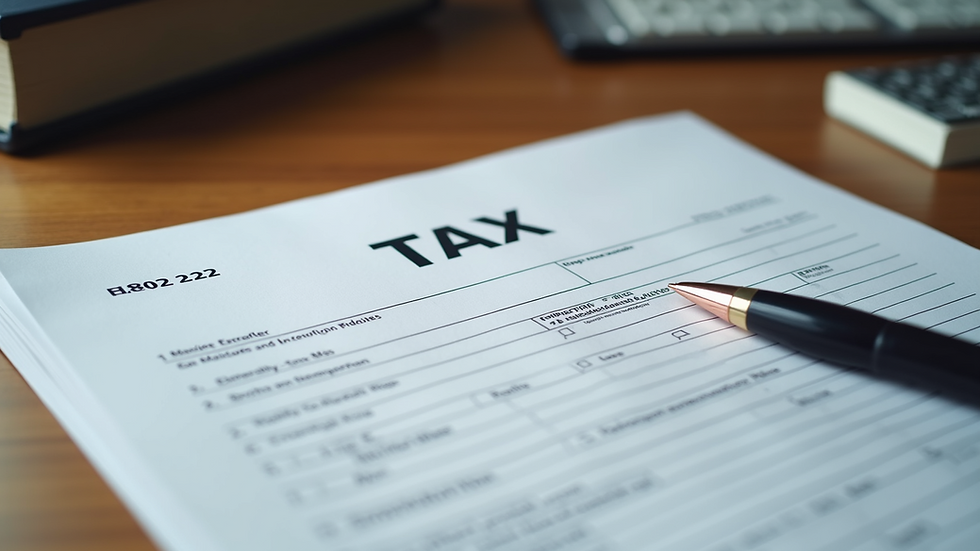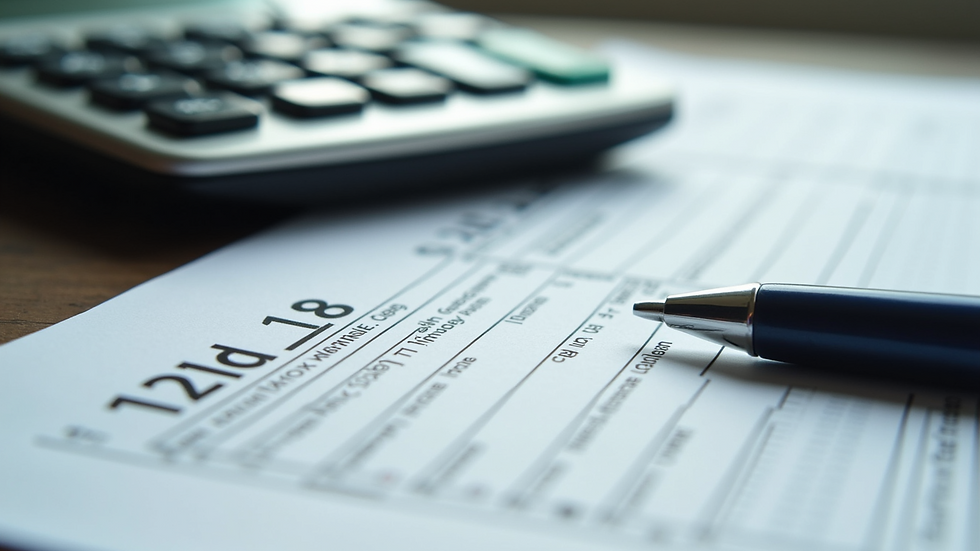The Importance of Timely Tax Filing and the Consequences of Neglecting It
- knp gst
- Aug 6, 2025
- 4 min read
Tax season often brings a wave of anxiety for many. The task of filing taxes can feel overwhelming, but it is a crucial responsibility that cannot be ignored. Timely tax filing is essential for both individual and business financial health. Failing to meet deadlines can lead to severe consequences, from hefty fines to legal issues. This blog post explores why timely tax filing matters and the potential fallout from neglecting this important task.
Understanding Tax Filing
Tax filing is the process of submitting your financial information to the relevant tax authorities. This could be at the federal, state, or local level, depending on your residency. The primary goal of filing taxes is to report your income, calculate your tax liability, and ensure compliance with legal requirements. For instance, in 2022, the average American household received a federal tax refund of over $3,000, illustrating the importance of timely filings to secure these funds.
Importance of Timely Tax Filing
There are several reasons why filing taxes on time is crucial:
Avoiding Penalties: Tax authorities impose significant fines for late filings. For example, the IRS can charge a penalty of 5% of the unpaid taxes for each month your return is late, up to a maximum of 25%. This can add up quickly and put a strain on your finances.
Accessing Financial Benefits: Many individuals and businesses rely on tax refunds to cover essential expenses. A timely filing helps expedite your refund, allowing quicker access to funds for home improvements or educational expenses.
Timely tax filing also promotes a sense of financial responsibility. It provides an opportunity to evaluate your financial standing, plan for future expenses, and make informed decisions about your financial health.
Consequences of Not Filing on Time
Neglecting to file taxes on time can lead to severe consequences:
Financial Penalties: The IRS and other tax authorities charge failure-to-file and failure-to-pay penalties, which can accumulate rapidly. The longer your taxes go unfiled, the more you risk facing charges that can cripple your financial stability.
Complex Filing Process: Delaying your tax filing can make the process more complicated. You may lose essential documents or overlook necessary details, leading to the need for amendments, which can cause additional stress.
Increased Scrutiny: Consistently missing deadlines can raise red flags with tax authorities, potentially leading to audits. An audit is a lengthy and stressful process where you must provide detailed documentation of your financial activities.
Impacts on Financial Health
Failing to file your taxes on time can significantly impact your overall financial health:
Accumulating Interest on Debts: Unpaid tax liabilities can accrue interest over time, making your debts harder to manage. For example, the IRS typically charges interest at a rate of around 3% per year on unpaid taxes.
Damage to Credit Score: Tax authorities can file liens against properties if debts remain unpaid for long periods. Such liens can severely affect your credit report, making it harder to secure loans or mortgages in the future.
Establishing a strong financial foundation is vital for any individual or business. Neglecting your tax filing duties undermines this foundation and jeopardizes your ability to engage in financial activities like applying for loans or investments.

Legal Ramifications
Missing tax deadlines can also have severe legal consequences:
Possible Tax Evasion Charges: Failing to file taxes or misreporting income can be considered tax evasion, which is a serious crime. This can lead to significant fines and even potential prison time.
Higher Estimated Tax Bills: When you fail to file, tax authorities may estimate your tax liabilities based on available data. This estimated amount may be much higher than what you would normally owe, resulting in overpayments and the associated penalties.
The tax system relies on trust and compliance. Neglecting your obligations can disrupt this trust and lead to a cascade of penalties that only compound the issues you face.
How to Avoid Late Tax Filing
Preventing late tax filing is mostly about planning and organization. Here are some practical strategies:
Set Reminders: Use calendar apps to set reminders for important filing dates. These notifications can help you gather essential documents well in advance.
Stay Organized: Keep all tax-related documents in order. Create folders for key paperwork such as W-2s, 1099s, and receipts. Being organized can drastically reduce stress as the deadline approaches.
Get Professional Help: Consider hiring an accountant or tax professional, especially if your tax situation is complex. They can provide expert guidance and ensure that you file accurately and on time.
File for Extensions: If you genuinely cannot meet the filing deadline, consider applying for an extension. While this gives you more time, it does not eliminate your obligation to pay any taxes due by the original deadline.
Taking Control of Your Financial Future
Timely tax filing is a key aspect of financial management that should never be disregarded. The consequences of neglecting your tax responsibilities can lead to significant issues, including financial penalties and legal troubles.
By taking the time to file your taxes—or seeking professional assistance when necessary—you can ensure compliance and promote your financial health. Being proactive about your tax obligations fosters a sense of responsibility and better financial habits moving forward.
Adopting sound practices surrounding your tax obligations while remaining aware of deadlines can help you avoid the pitfalls of late filing. Your peace of mind and financial future depend on it.

A solid grasp of these elements can empower you to manage your finances effectively. Whether you are an individual or a business owner, prioritizing timely tax filing can save you from a host of potential problems. It will help keep you compliant with the law and secure your financial future.






Comments